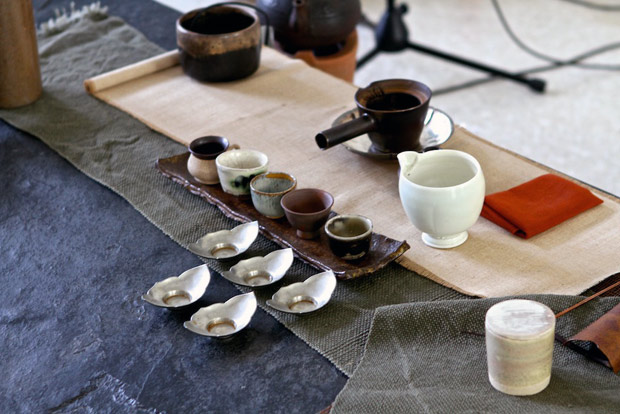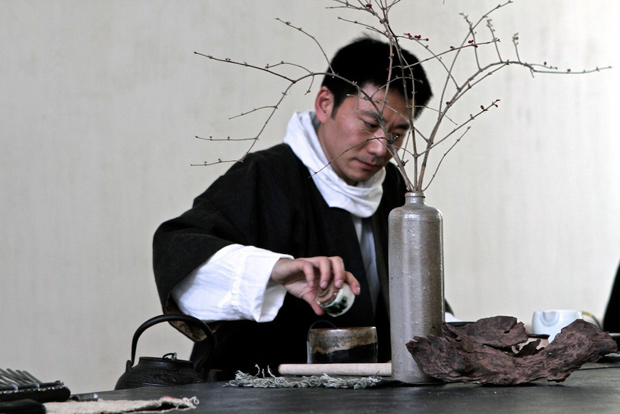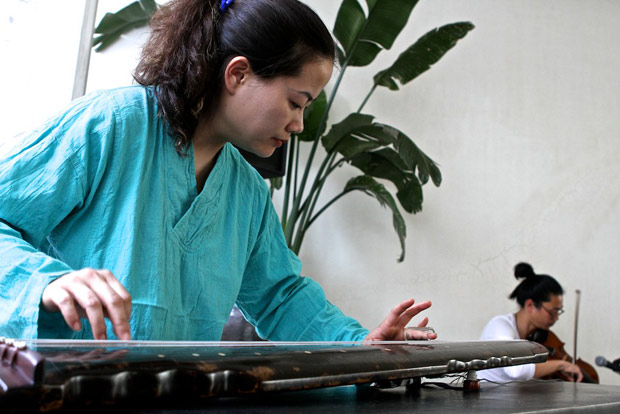The Tea Rockers Quintet
Our interview with Li Daiguo on the band’s experimental mix of tradition and ceremony


One of the most interesting phenomena to hit Chinese avant-garde music is The Tea Rockers Quintet—a tea ceremony performed by master Lao Gu and accompanied by the all-stars of Chinese contemporary music: contemporary folk singer Xiao He, China’s top noise artist Yan Jun, academic guqin player Wu Na and the young and talented instrumentalist, Li Daiguo. Together they create a mesmerizing blend of traditional instruments, vocalisms, noise music, and harmonious movement.
We recently had the chance to talk with Li Daiguo (aka Douglas Lee)—the ensemble’s eclectic musician and gifted solo performer—just before the release of their first album “Ceremony.”

How was the idea of the Tea Rockers Quintet born?
Yan Jun was invited to participate in a Swiss cultural/arts festival in 2010 and he put us together for two shows that went well. That was probably the catalyst for making us decide that this is a long-term project. Before that, we were all friends and had played together in various formations as duos and trios etc., but nothing regular like the Tea Rockers had become.

You have different styles and backgrounds, how do you work together?
We all love new music, different kinds of Chinese traditional music, improvisation, nature and each other. Finding the right blend is a matter of mutual listening and enjoying each others’ sounds. Musicians are often regularly getting new ideas or developing new skills and techniques, so it’s really important to improvise together to listen to who a person is and what they are saying at that moment and not be stuck in some image you have of their identity or who they should be based on your past experiences with them.

You started playing piano and violin when you were five years old. Where does your passion for music come from?
I trained in different kinds of classical music for years before I realized it was a form of expression that really works for me. It has become an important practice for me, and one of the guiding things in my life because it is such an integral part of how I keep learning more about my body and consciousness and other important things.
In your work you’ve been exploring several music traditions from all over the world—what contributed the most to shape your own style?
Western classical music and the classical musics of the erhu and pipa were huge influences early on in terms of technique. Later I studied bluegrass, played a lot of heavy metal, and was getting into different kinds of new music. Aesthetically I am really touched by so many different sounds, but I would say in recent years I have been influenced most by Shona music of Zimbabwe and different music from Mali. Of course I am still practicing 5-8 hours a day, so my ideas and techniques are still developing.

You grew up in Oklahoma and you studied in San Diego, why did you decide to leave the U.S. and come back to China?
Since I was young and was interested in erhu and other things about Chinese tradition, I was attracted to the idea of coming to China to live. My father is a pretty spiritual person and is really interested in Daoism and Buddhism, and that had some influence on me for sure. By the time I moved to Sichuan in 2004 I was already very interested in different kinds of spiritual practices, so one of the things in my mind in coming was to get closer to some of those traditions. When I arrived and stayed for a year there were so many doors opened and so many possible roads to go down I just decided to stay and eventually built my life here.
Released on 4 April 2012, The Tea Rockers Quintet’s debut album “Ceremony” is now available through Amazon and iTunes.










